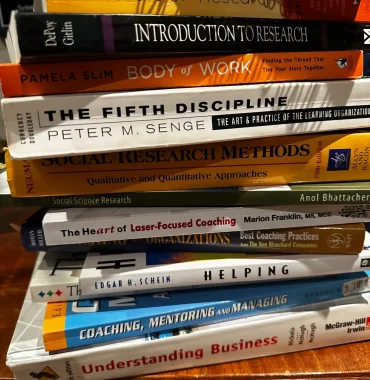Table of Content
Chapter 1 - Introduction and Research Question
Statement of Opportunity
Imagine a world where small business owners have access to professionally trained coaches, supporting them in developing the skills, confidence, and resources needed to contribute to a healthy world economy—creating secure and meaningful employment for others while maintaining personal prosperity and freedom. If only it were that easy. According to Innovation, Science and Economic Development Canada Small Business Branch (ISED), fifty one percent of small businesses do not make it to year five (ISED, 2021) (Turner & Endres, 2017). The surviving forty-nine percent struggle to get and keep their business profitable (Muthusamy & Kannan, 2023).
As it is to underestimate the importance of water for survival, so it would be to underestimate the crucial role of small businesses in local economic development, job creation, poverty alleviation, and overall economic growth (Gherghina, 2020). The International Labour Organization’s (ILO) reports, small businesses are responsible for seventy percent of all jobs globally (ILO, 2022). While small business owners are recognized as the drivers for economic growth (Ribeiro-Soriano, 2017), they are often the first to experience the effects of economic changes, whether positive or negative (Guidant Financial, 2019).
Start-ups and corporations often get help from government programs or venture capitalists (Mason & Brown, 2013). Main Street small business owners don’t—especially not during years three through eight when most have a viable business, several employees, and more struggles than they expected (Afful-Dadzie & Afful-Dadzie, 2016).
Considering all these challenges, it becomes crucial to examine who could potentially help small business owners. Through my experience of coaching small businesses for over fifteen years, and as an International Coaching Federation (ICF) credentialed coach for twelve of those years, I have observed that small business coaching is a less common niche in comparison to other coaching specializations, predominantly executive and leadership coaching. And, to highlight the gap, according to the ICF, less than 5% of their coaches identify as a small business coach (ICF, 2023). For small business owners, support in the form of coaching may not be obtained due to lack of availability, concerns about the expense, doubts about value, and lack of time (Mole et al., 2017).
This research explores how coaching by professionally credentialed coaches, specifically those who hold ICF credentials, can be an effective tool to help navigate these challenges and to gain an understanding that can inform the development of more targeted coaching strategies and programs for small business owners.
In this chapter, I introduce my research and emphasize my interest in coaching for small business owners, highlighting the significance of this study. I present the research background and context to provide an understanding of coaching, particularly small business coaching, and its priority and status. The research question is discussed to clarify the scholarships focus. In the opportunity and context section, I outline the intent, aiming to bring awareness of the need for small business owners to have access to coaching. Overall, this chapter sets the stage for an examination of the small business coaching market, emphasizing its importance, and providing context for the research study.

Research Question
The aim of the study is to explore the relationship between International Coaching Federation (ICF) credentialled coaches and small business owners. The overarching research question will ask “How can the ICF contribute to encouraging coaches to coach small business owners?” To help answer this primary research question, the sub research questions are outlined below:
- What are the unique characteristics of ICF credentialled coaches that would support small business owners?
- What are the coaching needs of small business owners?
- What influence does the ICF have on small business owner coaching?
Research Context
Justification for the study stems from the fact that a healthy small business community contributes to economic sustainability by creating jobs, generating revenue, promoting innovation and reducing poverty (Sawang, 2023) (Caldwell, 2017). Small businesses are essential to economic and social wellbeing (OECD, 2017). The COVID-19 pandemic continues to cause economic and financial disruptions for the small business community making it very difficult for many companies to continue (Zambrano et al., 2021).
The exploration of help from coaching for struggling small business owners makes for a timely research topic. With only 3% of ICF coaches having reported that small business coaching is their main area of focus (ICF, 2023), and with the needs of small business so high, it is fitting that we explore the gap in the small business coaching market.
When examining the application of coaching on small business, Compton (2012) research presents “strong evidence of business coaching’s effectiveness” (Crompton 2012, p.27). Entrepreneurs reported that having a business coach positively impacted their business performance and growth. This may present an opportunity for ICF credentialled coaches to support small business owners through coaching. The exploration of coaching small business owners aligns with the stated studies objectives.
In Support of this Research
The Grand Challenge for Research on the Future of Coaching reminds us that “the integrity of any field of practice rests on its intellectual foundations and research” (Boyatzis, Hullinger & Penafort, 2022). I was inspired after meeting Dr. Boyatzis to bring a question related to the efficacy of coaching for small business owners, a market sector that post 2020 COVID-19 pandemic continues to have a great need for professional help. Additionally, “entrepreneurship and small business is a growing discipline” (Liang & Dunn, 2011) which presents an opportunity for coaches, who are most often a small business owner themselves, seeking to grow their practice. Why is this important now? It may be the worst of times and the best of times (Strauss, 2020) for small business. Inflation, globalization, climate change, the war on Ukraine, all add to the already heavy burden small business owners face every day (OECD, 2023). Based on the above, I see a strong need for research on the role of coaching in supporting the well-being and ongoing development of small business owners (Zambrano Farias et al., 2021).
Author’s Context for Study
During my attendance at the 2019 ICF International Conference in Prague, Czech Republic, I observed biases expressed by coaches regarding working with small business owners. The coaches appeared to hold negative attitudes towards coaching small business owners, instead preferring to work with corporate executives and CEO’s of larger organizations. They also said that coaching small business owners was consulting, not coaching. Upon further investigation, I learned that the ICF currently does not have a small business community of practice. I seek to better understand the position of ICF coaches and find ways to encourage coaches to leverage their existing skills to serve the small business market.
Organizational Context
With the focus of the research on small business owners having access to a coach, the organization that may have some influence on the relationship between small business owners and coaches is the International Coaching Federation. The ICF is the “largest coach accreditation body in the world (Griffiths & Campbell, 2008). The role of the ICF as a membership organization that provides support, networking opportunities, continued education, and connections for coaches globally, will be explored through the lens of small business coaching.
The ICF’s mission is to advance coaching excellence, impact, and value worldwide and values professionalism, collaboration, humanity, and equity (ICF, 2023). Emphasizing the importance of responsibility, respect, integrity, competence, excellence, social connection, community building, kindness, compassion, and understanding the needs of others to promote equitable processes that create equality for all (ICF, 2023).
I am particularly interested in the ICF Core Competencies, the measure used to align, train, evaluate coaches and training providers for accreditation (ICF, 2020). The ICF has a commitment to empower coaches worldwide and with over fifty thousand members, the ICF represents one of the largest potential resources for small business owners to access a coach.
Theoretical Framework Perspective
To examine the research question, I will be utilizing Social Exchange Theory (SET) which is most often used in the explanation of business-to-business relationships (Lambe et al., 2001). The fundamental concept of social exchange theory is cost and rewards, (Roeckelein, 2018, p 5). Homan adds that “any interaction between individuals” is an exchange of resources (Homans 1958, p. 597). These resources go beyond goods or money to include social amenities like status or friendship (Lambe et al., 2001).
My aim is to gain a deeper understanding of the dynamics between small business owners and ICF credentialed coaches, identify shared objectives, and explore ways to facilitate stronger connections between them. The idea that cost and reward comparisons drive human decisions and behavior (Roeckelein, 2018, p 7) makes SET an idea theoretical framework to explore the topic. To better understand the impact of credentialling in the coaching field, articles related to training, education, accreditation in coaching were considered.
Definition of Terms
What is a Small Business?
There is not a standard definition of small businesses that is universally accepted. (Alsaaty, F. & Makhlouf, H. 2020). A business seeks to provide goods and services to others (Nickels, McHugh & McHugh, 2020) and can take many forms. The precise definition of a small business can vary depending on the industry and country and is most often based on the number of employees (B.C. Ministry of Jobs, Economic Recovery, and Innovation, 2021). For the purpose of this study I have chosen the Canadian definition of a small business as one with fewer than 100 employees (Government of Canada, 2022). In the United States, the Small Business Administration (SBA) defines a small business as having fewer than 500 employees for most industries (U.S. Small Business Administration, 2023). In addition to size, other characteristics of small businesses can include being independently owned and operated, having a small market share, and serving a local or niche market.

What is a Small Business Owner?
In my own words, a small business owner is someone who owns a business, has a specific number of employees depending on where in the world the business is located, seeks prosperity and personal freedom and is both resilient and risk taking. The terms entrepreneur or self-employed are often used to describe a small business owner. For additional context, Turner and Endres defines small business owners as “individuals who conceive, launch, and assume the risk for new economic activities in the form of a business venture” (Turner & Endres, 2017).
What is Coaching?
The primary definition of coaching I chose for this research comes from Whitmore, in Coaching for Performance, “Coaching is unlocking peoples potential to maximize their own performance.” This definition can be applied to all coaching disciplines, including sports, leadership, team, heath, and small business coaching (Whitmore, 2007).

Crompton defines business coaching as: a collaborative relationship between experienced business coaches and entrepreneurial leaders, focusing on business goals, entrepreneurs’ development, and contribution to firm growth (Crompton, 2012, p. 13).
The ICF describes coaching as “partnering with clients in a thought-provoking and creative process that inspires them to maximize their personal and professional potential” (ICF, 2023).
What is an ICF Credentialed Coach?
Searching for an academic definition of a coach, I found no consistency. ICF credentialed coaches are “professionals who have met stringent education and experience requirements” and have “demonstrated a thorough understanding of the coaching competencies” that set the standard in the profession (ICF 2023). Additionally, they adhere to strict ethical guidelines as part of ICF’s mission to protect and serve coaching consumers” (ICF, 2023). A distinction between an ICF credentialled coach and other helping professionals including consultants, mentors and trainers offering support to small business owners is that ICF coaches are not required to be the expert in their client’s business. An ICF coach is trained to provide an environment for learning and personal growth through inquiry (ICF, 2020). The essence of coaching is fundamentally non-directive, instead encourages self-exploration (Clegg et al.,2005)

Limitations and Delimitations
Limitations
A combination of a limited project scope and strict academic guidelines for carrying out the research, created a tight framework to explore the research question. Limitations included a cap of a maximum of three interviews which may not be fully adequate to explore the problem. The scope of the study was confined to the application of a case study methodology. Finally, only 200 hours were allotted as the time frame within which the research was to be completed.
Delimitations
I excluded articles that were more than ten years old unless it was identified as a reference from one of the more recent sources. By placing limitations on searches to those newer than 2013 and favoring articles from Research Gate, this helped develop a robust and recent list of peer reviewed papers to consider. I was also careful about accepting COVD-19 pandemic research as that event significantly changed a typical view of small business. Additionally, for primary data gathering, I excluded coaches with any personal connection to my own practice.


